How is Education Changing in 2024? Educators’ Predictions on AI, Mental Health, and Student Engagement
Posted by Des Sinkevich on April 26, 2024
Learning has evolved significantly in 2024, and to help us better understand how, Penn Foster Group recently surveyed experienced educators – from within our organization and from our social network – to better understand how learning, and learning technology, could impact education this year and beyond.

Jump ahead:
- Educators’ comfort level with utilizing AI in the classroom
- Educators are divided on using AI
- How educators are already using AI
- Educators on mental health challenges
- How educators feel about the future (and education’s biggest challenges)
When it comes to comfort with AI, educators run the gamut
Instructors show a varied level of comfort with using AI in their teaching roles, with responses spanning across the spectrum.
32% of surveyed educators are comfortable or very comfortable with AI, but more than a quarter (26%) say they are uncomfortable or very uncomfortable using AI as an instructor.
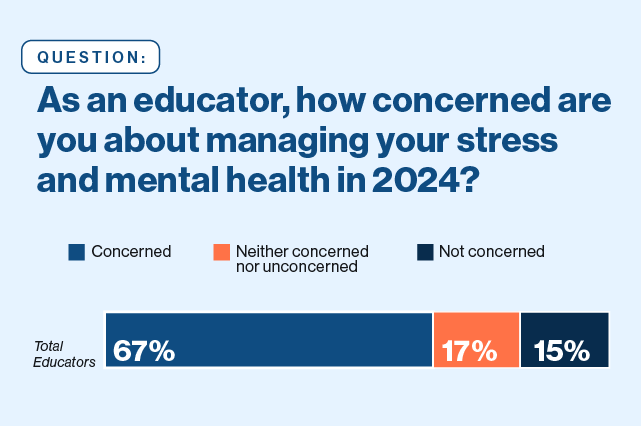
This gap in confidence and interest indicates a need for professional development and training in AI technologies to ensure instructors are well-equipped to integrate these tools into their teaching. In fact, our survey found that 29% of respondents primarily look to edtech organizations for guidance on utilizing AI in education, while 31% look to colleagues for guidance.
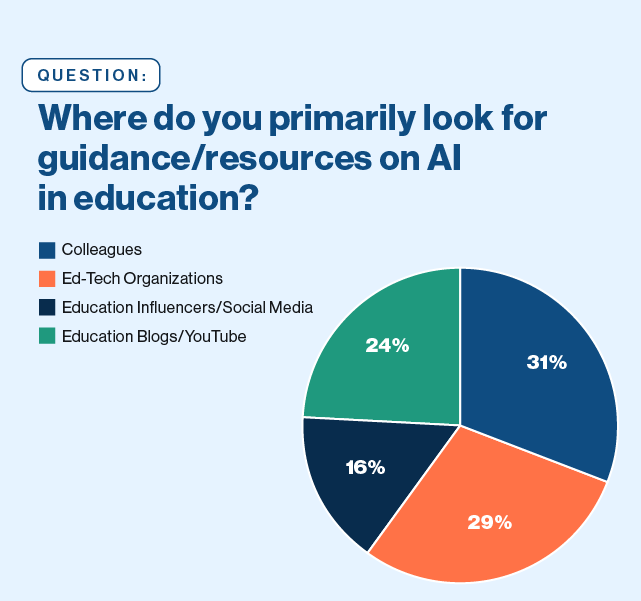
In addition to building skills, there is also some work to be done in building trust with the tool.
While AI itself isn’t new, the growth of generative AI, including tools like ChatGPT, has begun to reshape education and educational policies. With the ability to write complete paragraphs, essays, and produce other data and information, AI can be a helpful tool to both educators and learners. It does, however, create complications for academic integrity that need to be addressed, hence the trust issues. And, for those who don’t quite understand how, or why, to harness AI in their everyday work, it can also create a skills gap that can leave some educators behind.
Many educators are already using AI in the classroom—but not all
Despite the furor of media attention on AI, not all educators plan on using it in the classroom. However, nearly two-thirds of respondents say that they will be incorporating AI in their jobs as educators.
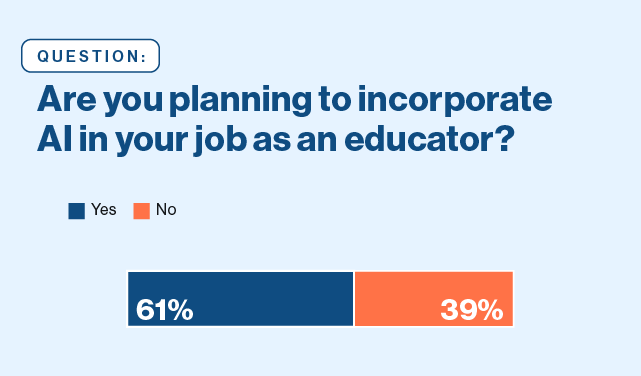
Among the 61% that do plan to use AI, there are still questions on why to use it. When asked how educators will use AI, one person said simply, “To be honest, I don't know. But I know AI will somehow be incorporated.”
These kinds of responses suggest that while there is interest in AI, there might be uneasiness about change, or a lack of resources on how to effectively integrate it into educational practices.
AI can absolutely be an asset for educators, especially those working in the online learning sector. Applications include using generative AI to augment teaching and learning resources, helping create engaging webinars, creating better rubrics for grading and offering feedback, designing lesson plans, and for overall organization.
“By incorporating AI technologies into my online teaching practice, I can streamline administrative tasks, provide personalized support to my students, and create more engaging and effective learning experiences,” mentioned one respondent. “However, it's essential to use these technologies thoughtfully and ethically, ensuring that they complement my teaching style and objectives while prioritizing student learning and success.”
Here’s how educators are already using AI with students
Besides a focus on AI, survey respondents also considered what strategies could be impactful in improving learner experience and growth over the next year. Several educators mentioned focusing more heavily on creating an experience that better fits the lives and needs of students – especially those enrolled in self-paced, online programs.
However, many educators are already utilizing AI in the classroom. Here’s how:
- Ideating creative ways to get students active
- Aiding in tutoring session
- Electronic communications
- Creating engaging posts for Facebook groups
- Brainstorming topics for projects
- Rewriting email responses
- Grading
- Creating assignments that utilize AI tools
- Brainstorming wrong answers when writing quiz/exam questions
- Writing drafts of examples, practice questions, and alternate explanations
Tools like AI can help students get real-time support when they need it. Aiding students in finding meaningful ways to begin using AI tools can unlock a valuable resource for them. Yet educators still have concerns, saying, “academic integrity and the use of AI still need to be addressed," while others point out that “[Students] will need more personal human guidance and clear instruction from a real person. Without [it], students will be misled to think the AI can do the work for them.”
56% of educators say effective technology usage is a major challenge for 2024
While many learners under 50 years old are, at minimum, competent with basic technology, older learners may struggle more to utilize the tools they need to succeed in their studies. And, as new technologies come into play, such as AI, learners will need more coaching on properly using these tools to supplement their learning.
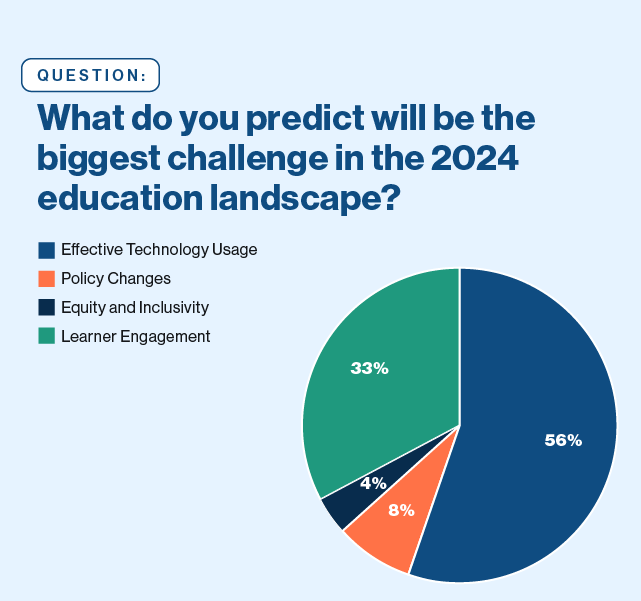
Despite concerns about the mental health challenges students face, educators are optimistic about the future.
Stress and mental health can make a big impact on learning and how educators do their jobs. While guiding learners through mental health challenges isn’t in the job description, supporting mental health can have a positive impact on students.
Right now, 70% of educators are concerned or very concerned about the mental health challenges their students face, which 53% feel is greater than the previous year.
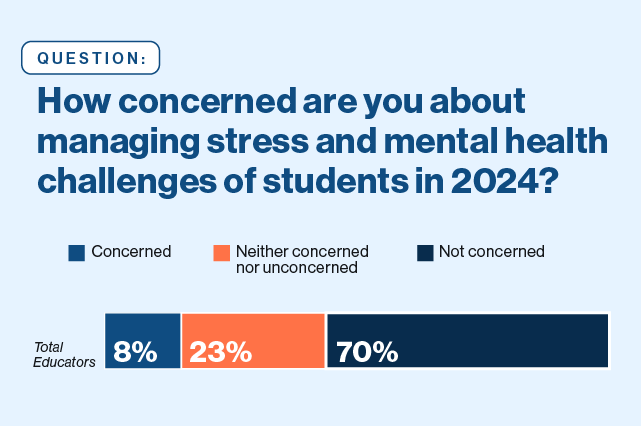
Writes one educator, “I see mostly a need to dedicate time to studies. I see [students] taking on second jobs and working long hours.”
Another said, “in general I feel that curriculum and standards are not accessible for modern students and don't consider their needs—greater mental stress, shorter attention spans, more economic disparity, etc. I think in general there needs to be an overhaul of expectations and standards—less is more.”
Nevertheless, more than half of educators are optimistic about the future
There's a general optimism among instructors about student success in 2024, suggesting confidence in the resilience and adaptability of students and the educational system to meet future challenges.
Heartwarmingly, 60% of educators surveyed are optimistic or very optimistic about student success in 2024 despite challenges they may face in the coming year. Only 4% were pessimistic or very pessimistic.
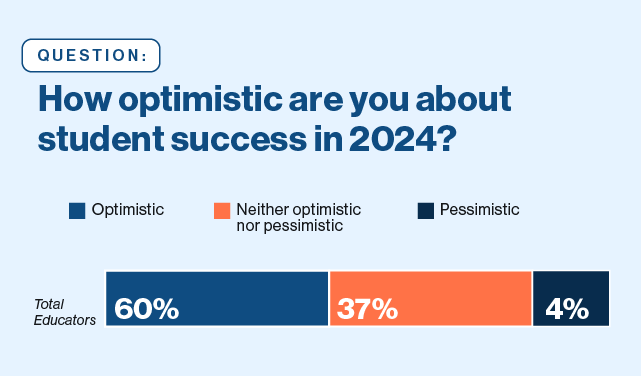
The biggest anticipated challenges educators expect to face in 2024 include learner engagement and effective technology usage. These challenges highlight areas where instructors feel improvements are necessary to enhance educational outcomes.
Educators face their own mental health challenges
Educators aren’t only concerned about the challenges their learners face; 67% of educators are concerned or very concerned about managing their own stress, mental health challenges, and burnout in 2024, which is 43% greater than the previous year.

As stress levels rise among learners and educators, it’s imperative to consider strategies to address the needs of both, ensuring we can continue to help students and teachers find success. Offering mental health resources and therapy benefits can ensure your teaching staff is well-equipped to help learners through their own challenges.
How educators believe mental health challenges should be addressed
Of the educators surveyed, 44% agree that offering access to counseling for learners is essential. Finding ways to provide access to help and support in an online, or in-person, education space could be a strong strategy – whether that means providing more information and resources as part of the curriculum or offering a bank of mental health resources learners can access to find help.
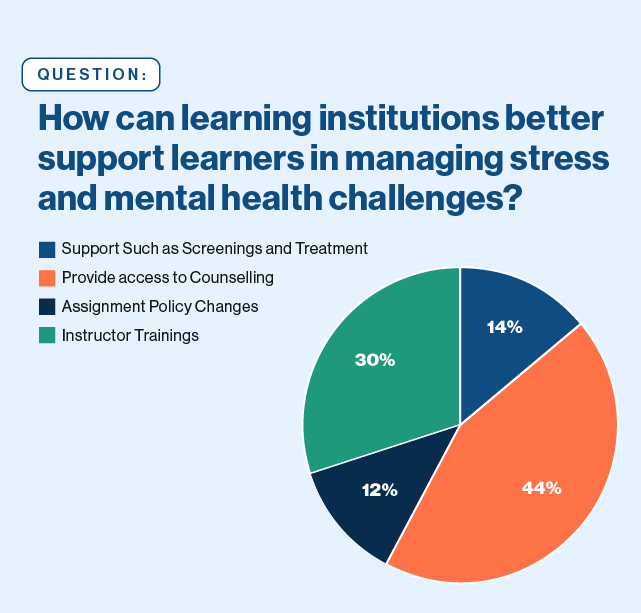
Additionally, 30% of educators believe more instructor trainings on stress and mental health could be beneficial to students, while 10% think that assignment policy changes that take these factors into consideration could make a difference.
Regarding their own needs, 73% of educators believe that increased flexibility in work hours and paid time off could help ease stress and burnout. Ensuring they have the right skills and enough training is also essential to decreasing burnout.
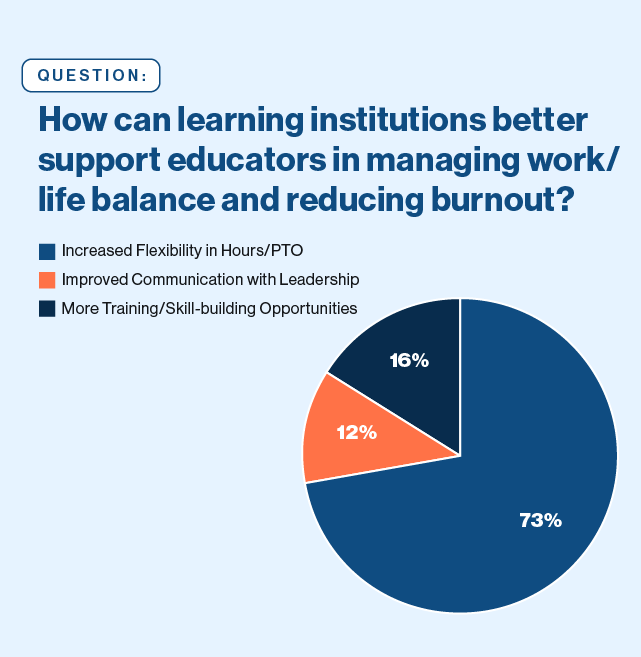
33% of educators report student engagement to be a primary challenge
Learner engagement is also predicted to be a challenge, according to 33% of survey respondents. Institutions may need to adapt their curricula and teaching strategies to meet the needs of students with diverse learning styles, learning challenges, and backgrounds.
Where do we go from here?
Today, technology and learning design are evolving faster than ever. It’s vital that educators and institutions continuously look forward and adapt to changes rapidly. As we move through the second half of the year – and beyond – we need to focus on not just keeping up but innovating new ways to learn and teach and getting instructors on board.
Through adoption of AI tools, and effective training on how to use them for both learners and educators, institutions can quickly work to adjust course content and provide comprehensive resources for students, taking steps to ensure that what they learn is accessible and relevant.
Learn more about how Penn Foster High School and Career School can support your organization’s workforce development goals.
Data Source: Predictions in Education Survey conducted by Penn Foster Group, fielded March - April 2024. Sample Size: 53 respondents.
Video Transcript
Everything that happened to us in the past does not determine our future.
One, two, three, four…
(Music plays)
The most impressive things that I learned about you all, are the fortitude, the determination you demonstrated during your academic journey. Many of you doubted whether you should even enroll in the program that you’re in, but you did it anyway.
(Music plays)
You have proven to yourself and anyone who ever doubted you that you have what it takes. And this is just the beginning of what you’re capable of achieving. If you can close your eyes and see yourself as a business owner, a doctor, a lawyer, or whatever you want to be, you are well on your way to becoming that bigger more improved version of yourself. Never stop learning.
(Music plays)
Congratulations and godspeed.
(Applause)